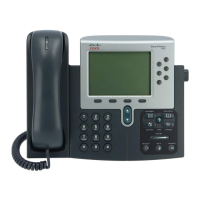4-9
Cisco Unified IP Phone Administration Guide for Cisco Unified Communications Manager 7.1
OL-18913-01
Chapter 4 Configuring Settings on the Cisco Unified IP Phone
Network Configuration Menu
Table 4-3 describes the IPv4 configuration menu options.
Table 4-3 IPv4 Configuration Menu Options
Option Description To Change
DHCP Indicates whether the phone has DHCP enabled or
disabled.
When DHCP is enabled, the DHCP server assigns the
phone an IPv4 address. When DHCP is disabled, the
administrator must manually assign an IPv4 address to the
phone.
1. Unlock network configuration
options.
2. Scroll to the DHCP option and
press the No softkey to disable
DHCP, or press the Yes softkey
to enable DHCP.
3. Press the Save softkey.
IP Address Internet Protocol version 4 (IPv4) address of the phone.
If you assign an IPv4 address with this option, you must
also assign a subnet mask and default router. See the
Subnet Mask and Default Router options in this table.
1. Unlock network configuration
options.
2. Set the DHCP option to No.
3. Scroll to the IP Address option,
press the Edit softkey, and then
enter a new IP Address.
4. Press the Valid ate softkey and
then press the Save softkey.
Subnet Mask Subnet mask used by the phone.
1. Unlock network configuration
options.
2. Set the DHCP option to No.
3. Scroll to the Subnet Mask
option, press the Edit softkey,
and then enter a new subnet
mask.
4. Press the Valid ate softkey and
then press the Save softkey.
Default Router 1
Default Router 2
Default Router 3
Default Router 4
Default Router 5
Default router used by the phone (Default Router 1) and
optional backup routers (Default Router 2–5).
1. Unlock network configuration
options.
2. Set the DHCP option to No.
3. Scroll to the appropriate Default
Router option, press the Edit
softkey, and then enter a new
router IP address.
4. Press the Valid ate softkey.
5. Repeat Steps 3 and 4 as needed
to assign backup routers.
6. Press the Save softkey.

